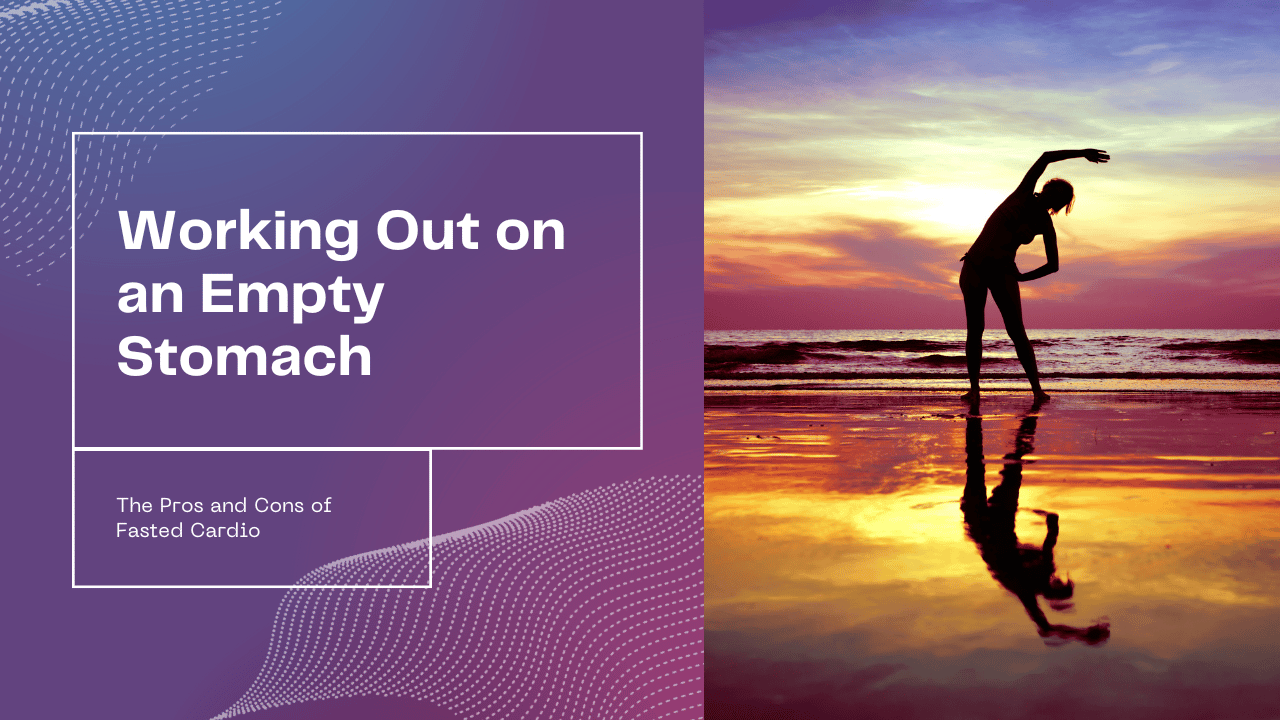The question, “Is it OK to workout on an empty stomach in the morning?” is widely debated among fitness enthusiasts. This practice varies in effectiveness based on individual body responses and fitness goals. While some may benefit from burning stored fats during a fasted workout, others might experience decreased performance or health risks. Understanding your body’s energy utilization in a fasted state is key to making an informed decision. It’s not just about following a trend; it’s about recognizing your unique health needs and fitness objectives.
Understanding Fasted Workouts
Fasted workouts occur when the body exercises without recent food intake, typically in the morning after an overnight fast. In this state, the body switches from using carbohydrates to burning stored fats and muscle glycogen for energy. Research, like that from the University of Bath, suggests increased fat burning in a fasted state. However, individual responses vary, and some may face reduced energy levels or muscle breakdown. A balanced view is crucial in considering whether fasted workouts fit your fitness plan.
Benefits of Morning Fasted Workouts
Exploring the benefits of morning fasted workouts is essential when considering the question, “Is it OK to workout on an empty stomach in the morning?” One of the primary advantages reported by many who favor this approach is the potential for increased fat burning.
When you workout on an empty stomach in the morning, your body, having fasted overnight, may not have immediate access to carbohydrates, which are its usual source of energy. In such a scenario, the body is more inclined to tap into stored fat reserves for fuel. This process can lead to a higher rate of fat burning during exercise, which is a compelling reason for those whose primary fitness goal is weight loss or body fat reduction.
Another aspect to consider when asking, “Is it OK to workout on an empty stomach in the morning?” is the relevance of this practice for those on intermittent fasting schedules. For individuals who follow intermittent fasting, aligning their workout routine with their fasting period can potentially amplify the benefits of both practices. During the fasting window, the body’s increased reliance on fat stores for energy can make morning fasted workouts particularly effective.
Moreover, some studies suggest that exercising in a fasted state, such as in the morning before breakfast, can positively impact insulin sensitivity and overall metabolic health. This means that for some people, working out on an empty stomach in the morning can be more than just an effective way to burn fat; it can also contribute to better long-term health outcomes.
In conclusion, when assessing whether it’s OK to workout on an empty stomach in the morning, it is crucial to consider these potential benefits. Increased fat burning and the alignment with intermittent fasting are significant advantages for many, making morning fasted workouts an appealing option for those looking to optimize their fitness regime.
Drawbacks of Exercising on an Empty Stomach
While many ponder, “Is it OK to workout on an empty stomach in the morning?”, it’s crucial to also consider the potential drawbacks of fasted workouts. Understanding these risks can help in making a well-informed decision about your exercise routine.
One significant concern when working out on an empty stomach in the morning is the possibility of reduced stamina and energy levels. Your body typically relies on readily available glucose from food for energy. In a fasted state, this energy source is limited, which can lead to decreased performance, particularly in high-intensity workouts or endurance activities.
Another risk associated with the decision to workout on an empty stomach in the morning is the chance of experiencing dizziness or hypoglycemia. Hypoglycemia, or low blood sugar levels, can occur when the body has exhausted its glucose supply. This can lead to symptoms like lightheadedness, nausea, and in severe cases, fainting. These symptoms not only hinder workout performance but also pose a safety risk, especially if you’re using heavy equipment or exercising in a remote area.
Furthermore, when asking, “Is it OK to workout on an empty stomach in the morning?”, it’s important to consider the potential for muscle loss. When deprived of carbohydrates, the body may start breaking down muscle tissue for energy, leading to a decrease in muscle mass over time. This is a particular concern for those aiming to build or maintain muscle through their fitness routine.
In summary, while there are potential benefits to working out on an empty stomach in the morning, one must also weigh these against the drawbacks like reduced stamina, risk of hypoglycemia, and possible muscle loss. These factors play a critical role in determining whether morning fasted workouts align with your individual health and fitness goals.
Who Should Be Cautious
When considering “Is it OK to workout on an empty stomach in the morning?”, it’s vital to recognize that fasted workouts may not suit everyone. Particularly, individuals with conditions like diabetes or a history of eating disorders should exercise caution, as fasted workouts could significantly impact blood sugar levels or trigger unhealthy patterns. Additionally, those focused on muscle building or high-intensity training should reconsider; potential muscle loss and reduced performance are important factors in such scenarios.
Furthermore, newcomers to exercise or those resuming after a break might find a more moderate approach, including a light pre-exercise meal, more beneficial. Consulting a healthcare professional is crucial in determining if it’s OK to workout on an empty stomach in the morning, particularly for those with specific health concerns or fitness objectives.
In summary, while fasted workouts may work for some, they aren’t universally applicable. Listening to your body and seeking expert advice are essential in ensuring a safe and effective fitness journey.
Best Practices for Fasted Workouts
When deciding if it’s OK to workout on an empty stomach in the morning, it’s essential to follow certain best practices to ensure the effectiveness and safety of your fasted workouts.
One of the key considerations for those pondering, “Is it OK to workout on an empty stomach in the morning?”, is proper hydration. Even if you’re not consuming food, your body still needs adequate fluids to function optimally, especially during exercise. Ensure you drink plenty of water before, during, and after your workout to stay hydrated.
Another crucial factor when determining if it’s OK to workout on an empty stomach in the morning is the timing and content of your last meal before fasting. Your last meal should ideally be balanced, containing a good mix of protein, healthy fats, and complex carbohydrates. This can provide sustained energy throughout your fasting period and prevent drastic drops in blood sugar levels during your workout.
For those who find that working out on a completely empty stomach in the morning doesn’t suit them, considering a light pre-workout snack can be beneficial. This doesn’t negate the concept of fasted workouts but rather tailors it to individual needs. Light snacks like a banana, a small yogurt, or a handful of nuts can provide enough energy to enhance your workout performance without feeling too full or uncomfortable.
In summary, if you’re asking, “Is it OK to workout on an empty stomach in the morning?”, remember that success in fasted workouts often lies in these details. Proper hydration, mindful eating the night before, and possibly a light pre-workout snack are all factors that can contribute to a more effective and enjoyable fasted workout experience.
Conclusion
In concluding our exploration of “Is it OK to workout on an empty stomach in the morning?”, it’s clear that the approach carries both benefits and drawbacks. For those aiming at weight loss, the increased fat burning from morning fasted workouts can be advantageous. Conversely, risks like reduced stamina and potential muscle loss should not be underestimated, particularly for individuals with specific health goals or conditions.
Ultimately, the decision hinges on personal health and fitness objectives. Listening to your body and consulting health professionals are critical steps in determining if it’s OK to workout on an empty stomach in the morning. This approach ensures that your fitness choices align with your overall health and well-being.
In essence, “Is it OK to workout on an empty stomach in the morning?” is a question with varied answers, dependent on individual circumstances. By weighing the pros and cons and seeking expert advice, you can make a choice that supports your unique health journey.
FAQ’s
- Is it good to workout on an empty stomach in the morning?
Yes, for some, it’s beneficial. Exercising in a fasted state can enhance fat burning. However, individual experiences may vary.
- Is it bad to workout fasted in the morning?
Not necessarily. While it’s OK to workout on an empty stomach in the morning for some, others may experience reduced energy or muscle loss. It’s crucial to consider personal health goals.
- Can I workout after waking up?
Certainly. Morning workouts can be invigorating. If concerned about whether it’s OK to workout on an empty stomach in the morning, a light snack can help ease into the routine.
- Do morning workouts burn more fat?
Potentially, yes. Exercising in the morning, especially fasted, might tap into fat stores for energy. Effectiveness varies based on individual metabolism.
- Which time is best for gym?
It varies. The best time is subjective and depends on personal preferences and energy levels. Morning workouts can be effective, particularly if you’re comfortable working out on an empty stomach.
- What is the best time for exercise?
It’s personal. Some find mornings ideal, while others prefer evenings. Experimenting with different times can help determine what’s best for you.
- Should I workout before or after breakfast?
It depends on your body’s response. If fasted workouts suit you, try exercising before breakfast. Otherwise, a light meal can provide necessary energy.
- What is a good morning workout routine?
A balanced routine with cardiovascular, strength, and flexibility exercises works well. If opting for a fasted workout, start gently and increase intensity as comfortable.




